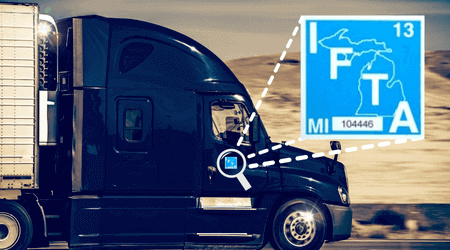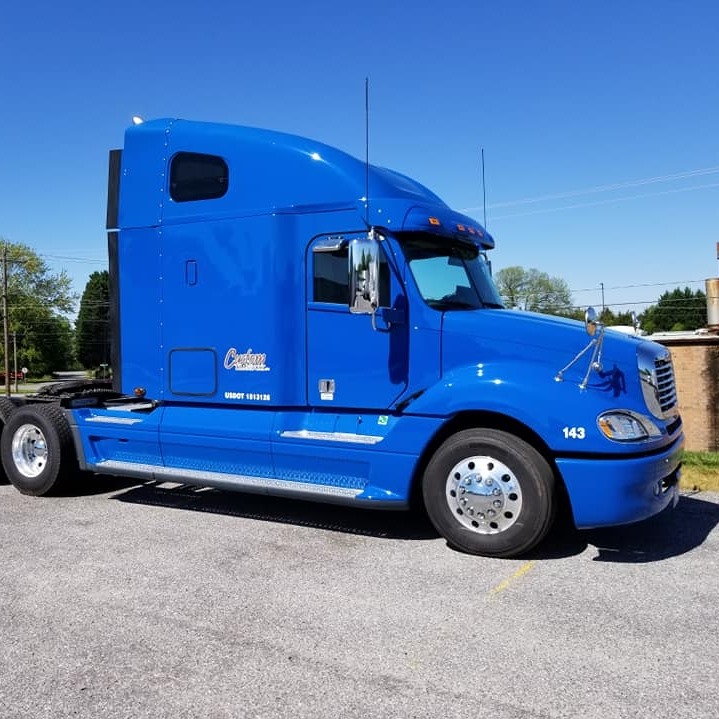Do you need IFTA stickers to drive across state lines in your truck?
Not sure what they’re for, where to get them, or how to avoid fines?
You’re in the right place. In this guide, we’ll break down everything you need to know about IFTA stickers in plain English — no confusing tax talk.
You’ll learn what IFTA is, why the stickers matter, who needs them, how to get them, and how to stay compliant so you can keep rolling without any surprise penalties.

What Is IFTA?
IFTA stands for International Fuel Tax Agreement. It’s an agreement between 48 U.S. states and 10 Canadian provinces. (Hawaii and Alaska are not included.)
Before IFTA, truckers had to get a separate fuel permit for every state they drove through. It was confusing, costly, and full of paperwork. IFTA changed that.
Now, truck drivers only need to report all their fuel use and mileage to one place — their home State also called the base jurisdiction.
How IFTA Works
Here’s the simple version of how IFTA works:
- You track the miles you drive in each state.
- You keep records of how much fuel you buy and where you bought it.
- Every quarter, you file a fuel tax report with your base jurisdiction.
- Your base jurisdiction figures out how much fuel tax you owe to each state.
- You pay one amount, and they handle the rest.
This way, the taxes get shared fairly between the states you drove through.
Why You Need IFTA Stickers
If you drive a qualifying commercial vehicle between states, you must have current IFTA stickers on your truck — no exceptions.
Who Needs an IFTA Sticker?
You’ll need IFTA stickers if:
- Your vehicle has two axles and weighs over 26,000 pounds or
- Your vehicle has three or more axles, no matter the weight, and
- You drive in two or more member states or provinces.
That includes most semi-trucks, big rigs, and fleet vehicles. Even owner-operators need to follow these rules if they cross state lines.
What the Sticker Does
The IFTA sticker shows that you are registered with IFTA and are reporting your fuel taxes correctly. It’s proof that you are staying legal. If you don’t have a sticker, or if it’s in the wrong spot, you could get fined or pulled off the road.
Now that you know who needs IFTA stickers and why they matter, let’s walk through how to actually get them and where they need to go on your truck.
How to Get IFTA Stickers and Where to Place Them
Getting IFTA stickers is a pretty easy process if you follow the steps.
Step 1: Apply with Your Base Jurisdiction
To get your IFTA stickers, you’ll need to apply through your base jurisdiction — this means the state where your trucking business is based and registered.
Your base jurisdiction is the state where you keep your business records and where most of your trucks are based. This is the only state you’ll report your fuel taxes to — even if you drive through many others.
Most states let you apply online through their Department of Revenue or motor carrier services website.
You’ll need to provide:
- Your business name and address
- Your USDOT number
- Your EIN (Employer Identification Number)
- Truck details (VIN, plate number, etc.)
Step 2: Receive Your IFTA License and Stickers
Once approved, you’ll receive:
- An IFTA license (keep this in your truck at all times)
- Two IFTA stickers
Step 3: Place the Stickers Correctly
Put one sticker on each side of your truck’s cab, near the door, and at eye level. They must be clearly visible to law enforcement.
If they can’t see them or they’re missing, you could get a fine — even if you filed your taxes correctly.
Once your IFTA stickers are in place, it’s important to know the costs involved — and what can happen if you don’t follow the rules.
Common Fees and Fines with IFTA Stickers
IFTA stickers are pretty straightforward to get, but staying compliant is just as important. Even small mistakes — like missing a deadline or misplacing a sticker — can cost you.
Are IFTA Stickers Free?
In most states, IFTA stickers come at no charge. However, some states charge a small fee, and there’s usually a replacement fee if your stickers are lost or damaged.

What If You Don't Follow the Rules?
Here’s what could happen:
- Missing stickers – You may get fined or pulled over.
- Incorrect sticker placement – You could be fined.
- No IFTA license in the truck – That’s also a violation.
- Late filing or underpayment – IFTA penalties are 10% of the tax due or $50, whichever is greater.
And yes, they do enforce it.
The good news? Most of those fines are easy to avoid if you stay on top of a few key IFTA rules and reminders.
IFTA Compliance Reminders
Staying compliant with IFTA isn’t hard, but you do need to stay on top of deadlines and recordkeeping. Here are some things to keep in mind:
-
Renew on Time
Your IFTA license expires on December 31 each year. Renew early so your new stickers arrive before January 1.
-
Keep a Record of Your Stickers
You don’t need to keep the physical sticker after it expires — that’s nearly impossible. But you should keep a clear photo or photocopy of each sticker, including the unique ID number. This helps if you're ever audited or need to verify past compliance. Hang onto these records for at least 3 years, just like your IFTA tax filings.
-
Always Carry Your License
Your IFTA license should always be in the truck — it's required by law. The best practice is to keep it stored with your other important permits, like your cab card, registration, and insurance documents. That way, everything is in one place and easy to find if you're pulled over or inspected.
-
File Your Quarterly Reports
You’ll file reports every three months (even if you didn’t drive that quarter). Missing a report can lead to penalties and suspended licenses.
What If You Lose Your IFTA Stickers or License?
If something goes missing — your sticker falls off, or your license is lost — contact your state’s IFTA office right away. Most states allow you to request replacements quickly, but you may have to pay a small fee.
Final Thoughts: Keep Your IFTA Compliance Simple
Now you know what IFTA stickers are, why you need them, how to get them, and what it takes to stay compliant.
Fuel tax rules can be confusing — and missing even one step can lead to delays, fines, or unwanted trouble on the road. If you’re a driver or fleet manager crossing state lines, IFTA compliance is something you can’t afford to ignore.
If keeping up with fuel tax filings feels like one more thing on an already full plate, consider getting help from a trusted IFTA compliance service. We recommend working with our partner, Wide Open Road Compliance, to make sure your filing is done right and on time — every time.
At Superior Trucking Payroll Service, we’re here to help you stay focused on driving and growing your business — not paperwork. Whether it’s payroll or helping you find the right partners for compliance, we’ve got your back.
Written by Melisa Bush
With over 15 years of experience in the trucking industry, Melisa is well-versed in the complexities of trucking payroll and adept at navigating special circumstances. Before joining Superior Trucking Payroll Service, Melisa worked at a trucking company, where she managed driver miles and expenses for a fleet of 50 trucks. This hands-on experience gives her unique insight into the challenges our clients face when preparing their payroll data.
Melisa’s top priority is customer service. She strives to treat each client as an individual with genuine needs, rather than just another number in the system. Her goal is to alleviate the burdens of our clients and make their daily operations smoother.

